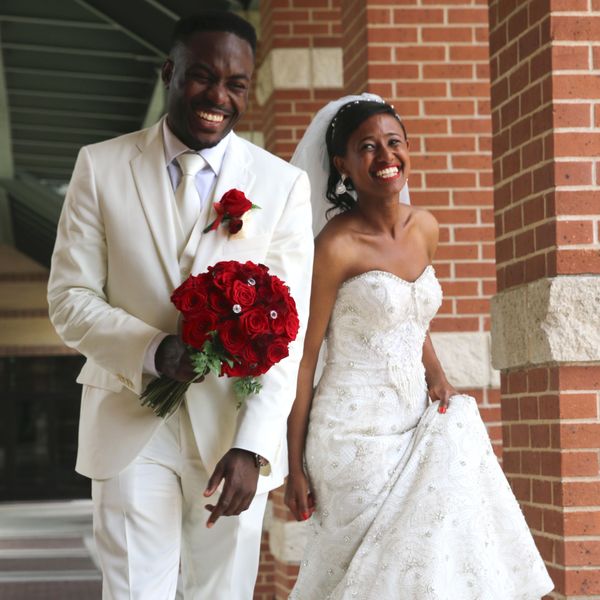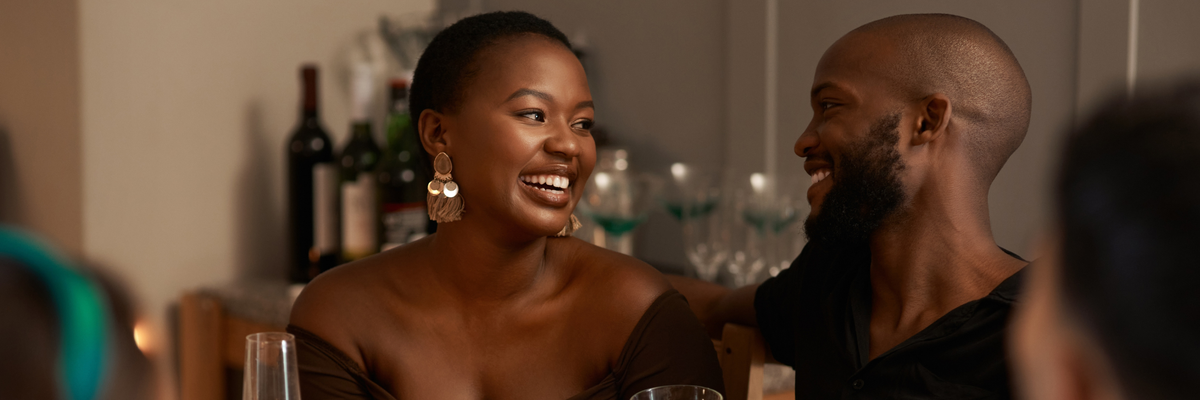This Couple Reveals The Lessons They Learned In 10 Years Of Marriage

In xoNecole's Our First Year series, we take an in-depth look at love and relationships between married couples with an emphasis on what their first year of marriage was like.
With one look at Eric and Shonda White, you can see a love that has withstood the test of time.
Their story had very humble beginnings through a chance meeting at Atlanta's Leopard Lounge one summer night in 2006. At the time, Shonda was a new transplant to Atlanta by way of Kentucky and wasn't looking for a relationship but as she puts it, "God had other plans." The spark was instant and slowly but surely, intellectually and mentally, Eric and Shonda fell for each other.
The writer/marketing strategist and the Sr. Compliance Specialist have been partners in love for twelve years and made their union official by tying the knot on September 20, 2008. It's a day Eric recalls fondly having been a calm and happy one for him. "When I saw Shonda for the first time coming down the aisle, it was surreal and spiritual," he said. "For me, it was a time of growth. When Shonda read her vows, it hit me that God ordained our union; that we have a lifetime to live and grow with each other."
This year, they celebrated ten years of marriage. And at 38 and 36 years old, respectively, Eric and Shonda are truly the loves of one another's lives. In this installment of Our First Year, the Whites break down how they knew each other was the one, early challenges in marriage, and their biggest love lessons throughout the years.

Chad Lawson Photography
The One:
Shonda: Before Eric, I really didn't know the difference between dating and courting, but Eric showed me what courting really looked like. It sounds old school, but it's still relevant today. I knew he was the one based on how he treated me and the fact that he let me be me. I used to merely hear "I love you," but this time, not only did I hear him say that he loved me, but he showed me that he loved me. There is no greater sign of a man who is in love than one whose actions match his words. We were long distance, but he made every effort to come and see me every month. He would drive literally 900 miles to see me at least once a month. I knew he was serious about dating me and having a future with me. I could tell by the way he treated me - he didn't just say he loved me, but he showed me through his actions.
"Not only did he say that he loved me, but he showed me that he loved me."
Eric: People ask [how I knew she was the one] a lot and I honestly tell people I can't explain it. I just knew. In my heart and mind, I knew Shonda was my wife. I didn't want another man to be with her. I wanted Shonda to be my wife and I wanted to spend my life with her. I knew she was the one!
As for approaching my courtship with marriage as the goal, I did. I can't explain it, but I took my relationship with Shonda very seriously. And that was a first in my life, it was something different about her. I was at a point in my life where I wanted more than a random hookup or a superficial relationship.
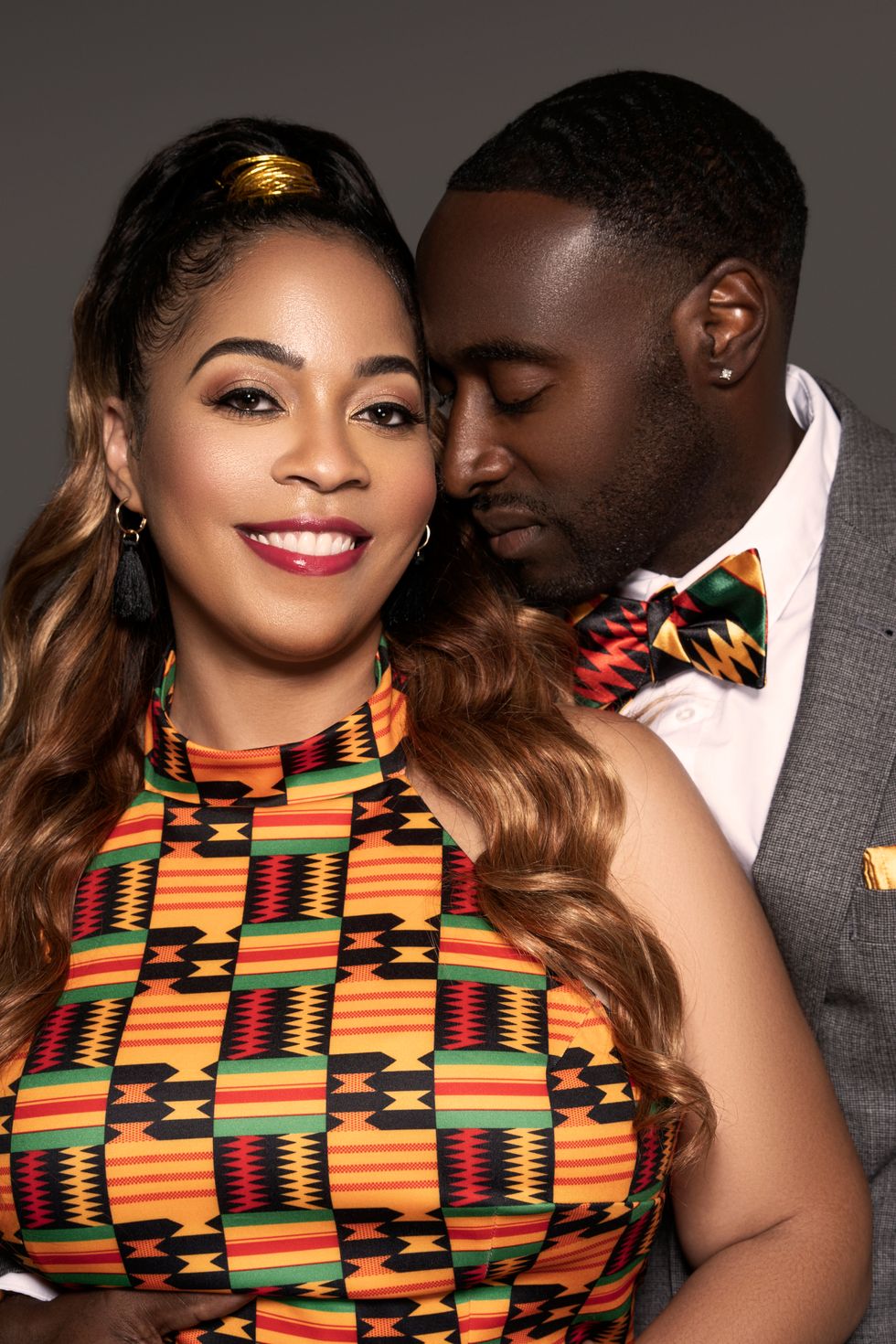
Chad Lawson Photography
Overcoming Fears In Marriage:
Shonda: Honestly, being a wife was my biggest fear. I feared the unknown, so I put a lot of pressure on myself to be the "best wife" I could be based on what I thought a wife should be or what I saw other people doing. Little did I know, I was the one putting that pressure on myself...not my husband. Eventually, I realized that he loved me for me - not merely for what I could do for him. So, the best thing I could do was be myself.
Eric: Feeling vulnerable and trusting a woman. I always knew I wanted a friendship with my wife that would last a lifetime. I made a decision to love my wife and to do the right things to keep my marriage healthy. I let go of my fear and had faith in our union.
Early Challenges:
Shonda: You know the part of the vows where you say, "For better or worse," but our first year of marriage taught me very quickly that sometimes the "worse" comes before the "better." Our first year, we went through a lot of challenges including: natural growing pains as newlyweds, finances, recession, layoffs, having children, sex, and family grief due to the loss of loved ones. It's interesting now though because early on, we could argue, and it would last for days, but I know we've grown so much, because now we can have a disagreement or an argument, but it won't last nearly as long as it used to.
Eric: I think some of the early challenges dealt with understanding each other's habits and quirks. I accepted my wife for who she is, but I still can't stand when she chews gum! [As for tackling issues] Each marriage is different, but we tackled those issues when they occurred. I don't think there is an undiscovered bad habit (laughs). We coexist in joint spaces daily and know when we need our space. We agreed to work together regarding our finances. We have separate accounts and a joint account.
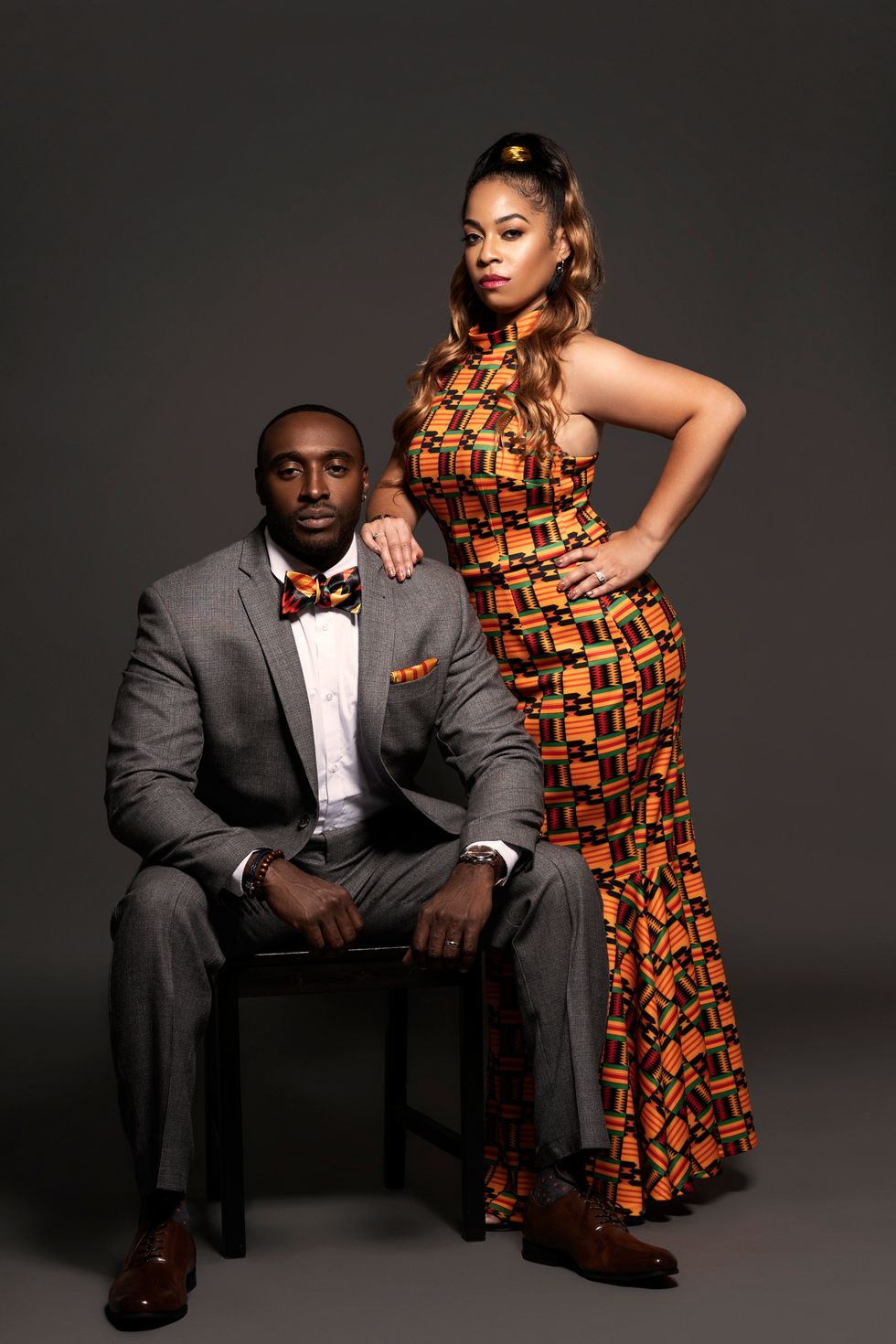
Chad Lawson Photography
Love Language:
Shonda: It was a little difficult initially to learn each other's love language. Before taking the Love Languages' assessment, I used to think that he didn't appreciate the gifts that I would give him because he didn't react in the way that I expected. Realizing his love language was completely different [than mine] helped me put things into perspective. So, instead of feeling hurt or disappointed about certain things, I had to remind myself that he doesn't speak the same love language necessarily.
Eric: My love language was pretty simple. But my wife is a hard person to buy a gift for. I think we work on giving and receiving love daily. Now, we are well-versed in our love languages and I will say I have to be intentional in putting gift giving for my wife in action.
Baggage Claim:
Shonda: I really had to unpack baggage from my past relationships' heartaches and disappointments and thinking that Eric was going to hurt me like the others had hurt me. Also, I had to release and relax some of my "Miss Independent, I don't need a man" habits. For example, some of the simplest things that my husband wanted to do for me - open my doors, carry my groceries, etc. - I would try to do myself. Often times, it wasn't the action itself; rather it was my attitude or my delivery when I reacted to him. At times, I made him feel as if I didn't need him or want him to help me. I would say things like, "I don't need you to do it. I can do it myself." I wasn't used to having a man in the home, so I had grown accustomed to doing mostly everything on my own since I was a little girl. I'm thankful, nonetheless, because growing up in a single-parent home helped shape me into the woman I am today. However, I also didn't want my man to feel like I didn't want or need him. Hence, I had to find a happy medium so that my man could still be the man he wanted to be for me. Just recently, Yvonne Orji posted a quote on her page the other week from a wedding she attended that said, "My greatest blessing in this life is to finally be able to take off my superwoman cape and let you carry it…" In other words, I like being an independent woman, but I love being able to depend on my man.
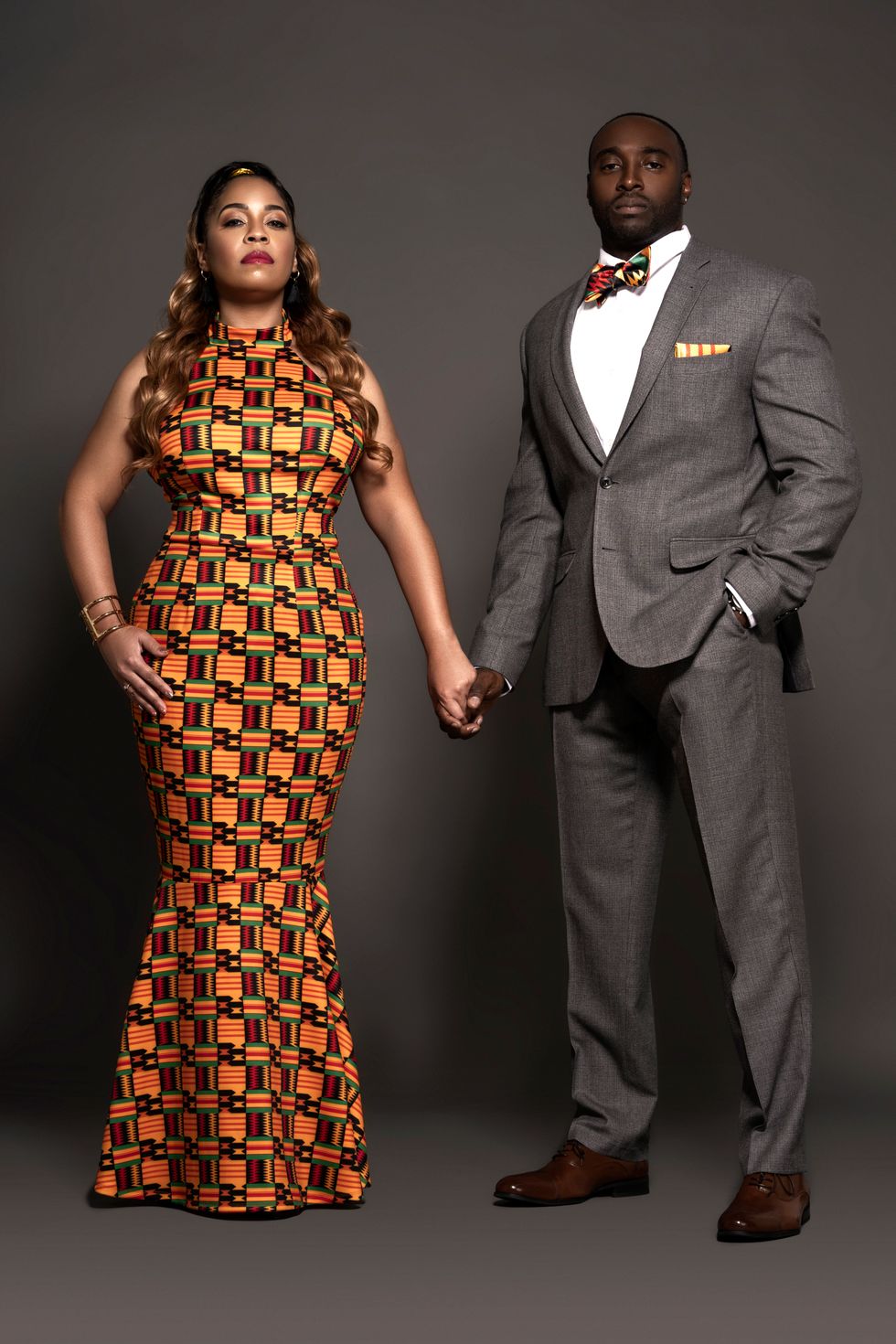
Chad Lawson Photography
"I like being an independent woman, but I love being able to depend on my man."
Eric: We have candid conversations about issues and figure out ways to address them. I had to learn empathy. I know it sounds crazy, but I had to stand in my wife's shoes sometimes to understand how she felt. I also had to learn to trust and be vulnerable. When you fall in love, you are vulnerable and to me that wasn't a comfortable feeling.

Chad Lawson Photography
Love Lessons:
Shonda: We may not always like what our spouse says or does, but we will always love each other, and we have to be committed to fighting for each other rather than fighting against each other. I also learned that I can be a strong, black woman, and still allow myself to be vulnerable and soft at the same time.
Eric: No matter what we go through, I couldn't see ourselves without each other. We truly have a spiritual bond.
Follow Shonda on Instagram. And click here to read past Our First Year love stories!
Because We Are Still IT, Girl: It Girl 100 Returns
Last year, when our xoNecole team dropped our inaugural It Girl 100 honoree list, the world felt, ahem, a bit brighter.
It was March 2024, and we still had a Black woman as the Vice President of the United States. DEI rollbacks weren’t being tossed around like confetti. And more than 300,000 Black women were still gainfully employed in the workforce.
Though that was just nineteen months ago, things were different. Perhaps the world then felt more receptive to our light as Black women.
At the time, we launched It Girl 100 to spotlight the huge motion we were making as dope, GenZennial Black women leaving our mark on culture. The girls were on the rise, flourishing, drinking their water, minding their business, leading companies, and learning to do it all softly, in rest. We wanted to celebrate that momentum—because we love that for us.
So, we handpicked one hundred It Girls who embody that palpable It Factor moving through us as young Black women, the kind of motion lighting up the world both IRL and across the internet.
It Girl 100 became xoNecole’s most successful program, with the hashtag organically reaching more than forty million impressions on Instagram in just twenty-four hours. Yes, it caught on like wildfire because we celebrated some of the most brilliant and influential GenZennial women of color setting trends and shaping culture. But more than that, it resonated because the women we celebrated felt seen.
Many were already known in their industries for keeping this generation fly and lit, but rarely received recognition or flowers. It Girl 100 became a safe space to be uplifted, and for us as Black women to bask in what felt like an era of our brilliance, beauty, and boundless influence on full display.
And then, almost overnight, it was as if the rug was pulled from under us as Black women, as the It Girls of the world.
Our much-needed, much-deserved season of ease and soft living quickly metamorphosed into a time of self-preservation and survival. Our motion and economic progression seemed strategically slowed, our light under siege.
The air feels heavier now. The headlines colder. Our Black girl magic is being picked apart and politicized for simply existing.
With that climate shift, as we prepare to launch our second annual It Girl 100 honoree list, our team has had to dig deep on the purpose and intention behind this year’s list. Knowing the spirit of It Girl 100 is about motion, sauce, strides, and progression, how do we celebrate amid uncertainty and collective grief when the juice feels like it is being squeezed out of us?
As we wrestled with that question, we were reminded that this tension isn’t new. Black women have always had to find joy in the midst of struggle, to create light even in the darkest corners. We have carried the weight of scrutiny for generations, expected to be strong, to serve, to smile through the sting. But this moment feels different. It feels deeply personal.
We are living at the intersection of liberation and backlash. We are learning to take off our capes, to say no when we are tired, to embrace softness without apology.
And somehow, the world has found new ways to punish us for it.

In lifestyle, women like Kayla Nicole and Ayesha Curry have been ridiculed for daring to choose themselves. Tracee Ellis Ross was labeled bitter for speaking her truth about love. Meghan Markle, still, cannot breathe without critique.
In politics, Kamala Harris, Letitia James, and Jasmine Crockett are dragged through the mud for standing tall in rooms not built for them.
In sports, Angel Reese, Coco Gauff, and Taylor Townsend have been reminded that even excellence will not shield you from racism or judgment.

In business, visionaries like Diarrha N’Diaye-Mbaye and Melissa Butler are fighting to keep their dreams alive in an economy that too often forgets us first.
Even our icons, Beyoncé, Serena, and SZA, have faced criticism simply for evolving beyond the boxes society tried to keep them in.
From everyday women to cultural phenoms, the pattern is the same. Our light is being tested.

And yet, somehow, through it all, we are still showing up as that girl, and that deserves to be celebrated.
Because while the world debates our worth, we keep raising our value. And that proof is all around us.
This year alone, Naomi Osaka returned from motherhood and mental health challenges to reach the semifinals of the US Open. A’ja Wilson claimed another MVP, reminding us that beauty and dominance can coexist. Brandy and Monica are snatching our edges on tour. Kahlana Barfield Brown sold out her new line in the face of a retailer that had been canceled. And Melissa Butler’s company, The Lip Bar, is projecting a forty percent surge in sales.

We are no longer defining strength by how much pain we can endure. We are defining it by the unbreakable light we continue to radiate.
We are the women walking our daily steps and also continuing to run solid businesses. We are growing in love, taking solo trips, laughing until it hurts, raising babies and ideas, drinking our green juice, and praying our peace back into existence.
We are rediscovering the joy of rest and realizing that softness is not weakness, it is strategy.
And through it all, we continue to lift one another. Emma Grede is creating seats at the table. Valeisha Butterfield has started a fund for jobless Black women. Arian Simone is leading in media with fearless conviction. We are pouring into each other in ways the world rarely sees but always feels.

So yes, we are in the midst of societal warfare. Yes, we are being tested. Yes, we are facing economic strain, political targeting, and public scrutiny. But even war cannot dim a light that is divinely ours.
And we are still shining.
And we are still softening.
And we are still creating.
And we are still It.

That is the quiet magic of Black womanhood, our ability to hold both truth and triumph in the same breath, to say yes, and to life’s contradictions.
It is no coincidence that this year, as SheaMoisture embraces the message “Yes, And,” they stand beside us as partners in celebrating this class of It Girls. Because that phrase, those two simple words, capture the very essence of this moment.
Yes, we are tired. And we are still rising.
Yes, we are questioned. And we are the answer.
Yes, we are bruised. And we are still beautiful.

This year’s It Girl 100 is more than a list. It is a love letter to every Black woman who dares to live out loud in a world that would rather she whisper. This year’s class is living proof of “Yes, And,” women who are finding ways to thrive and to heal, to build and to rest, to lead and to love, all at once.
It is proof that our joy is not naive, our success not accidental. It is the reminder that our light has never needed permission.
So without further ado, we celebrate the It Girl 100 Class of 2025–2026.
We celebrate the millions of us who keep doing it with grace, grit, and glory.
Because despite it all, we still shine.
Because we are still her.
Because we are still IT, girl.
Meet all 100 women shaping culture in the It Girl 100 Class of 2025. View the complete list of honorees here.
Featured image by xoStaff
Someone's Trying To Hook You Up? Ask These 6 Questions First
As we all know, it’s cuffing season. We’re also on the cusp of the holiday season, and that happens to be the time of year when a lot of people get engaged. And that’s why the fall and winter seasons are the times of the year when folks wanna play matchmaker.
And so, sis, if at least one person in your life is currently trying to set you up with someone they know right now — charge it to it being “tis the season” more than anything else. Because let’s be real — folks tend to be more lovey-dovey than ever right about now, and that is usually what inspires them to try to get as many people boo/bae’d up as possible. Chile…CHILE.
It’s not like it has to be a bad thing. In fact, studies say that somewhere around 15 percent of engaged couples actually met through a friend. All I’m saying is, before you entertain someone’s “I’ve got someone I want you to meet” invitation, it would benefit you to interview them first — for the sake of all parties involved.
The questions that I recommend asking? The following six are what I think can get everyone on the same page, so that there is more pleasure than regret from the hook-up attempt.
1. Why Are They So Invested?
 Giphy
GiphyTwo things that I recently watched over again are the series Survivor’s Remorse (the writing is so damn good) and a movie called Trapped in Temptation (both are currently on Tubi). Something that both of them made me think about is the fact that motive reveals a lot when it comes to why people say and do the things that they do.
When it comes to the movie, specifically, without giving the film away — let me just say that, if you are in a relationship, be really careful about listening to individuals who try to talk you out of maintaining it. More times than not, the motive is shady as hell. And honestly, sometimes people who are close to obsessed with you being in one deserve a bit of side-eye too.
Now, if it’s someone who loves all things love, they are in love and they want you to experience something similar — that’s sweet. Just make sure that they are approaching the set up from a healthy space. What I mean by that is they don’t see singleness as some sort of relational handicap or they aren’t trying to override what you want for your life as if they somehow know better (there are so many ways to be a control freak, y’all).
Hmph. Now that I think about it — make sure that the set-up crew isn’t trying to use you to “save” some male friend or relative of theirs. I say that because I once knew a mother whose son had — count ‘em — 10 kids and she was FOREVER trying to get me to date him. Girl, that wasn’t for me. She was looking for a Holy Ghost Jr. for that child of hers. I’ll pass. HARD PASS.
Bottom line with this one — if someone wants to set you up with someone else, the first thing to ask is why? Make sure to really listen to what their answer is. Then pay attention to if your mind, body and spirit are at peace with their answer(s).
2. Do They Know What You Want?
 Giphy
GiphyI don’t know about y’all, but the people (and let’s be honest, by far, it’s usually women) who have tried to set me up with someone? They didn’t even know what my preferences or type was. Hell, they didn’t even know my thoughts or timeline as it relates to being in a serious relationship were either. And what that boils down to is they were trying to hook me up based on their agenda, not mine — and that usually meant that the guys who they came up with? Yeah…I was good on them. LOL.
Yeah, if someone wants to hook you up, you definitely should ask them if they know what you are looking for in a guy when it comes to his looks, personality, passions, spirituality, relational desires and goals, location, etc. Because, indeed, what is the point in going out with someone who is fine as hell and yet, you want kids and he doesn’t (or vice versa) or who has a great personality yet he isn’t even in the same ballpark of your spiritual beliefs?
If your friend really wants to help you out, valuing your time should come with that — and that means bringing someone into your life who complements your lifestyle. No wiggle room here.
3. Are They Aware of Your Deal-Breakers?
 Giphy
GiphyLast year, I wrote an article for the platform entitled, “Should Bad Sex Actually Be A Relationship Deal-Breaker?” The thing that I think needs to go on record about deal-breakers is they aren’t exactly standards that you have. No, a deal-breaker is something that can’t be worked out even after trying to negotiate or compromise. When it comes to relationships, a deal-breaker might be how long two people should date before becoming exclusive or getting engaged. Another deal-breaker might be if being religious is more important than being spiritual and how that manifests itself (church or no church, etc.). And yes, another deal-breaker may be what each other’s sexual needs and expectations are.
When someone is setting you up, it is imperative that they know about your standards. For instance, for me, I am not interested in dating a divorced person, pretty much ever (I Corinthians 7:10-11). I’ve had friends who have tried to hook me up with that demographic before and it has always been a moot effort. The fact that some of them have gotten frustrated with my convictions has absolutely nothing to do with me. Some have tried to get me to compromise my deal-breakers too — like a long-distance relationship. Is it a firm “naw”? No. However, it’s not really something that I am interested in, so why not just…recommend someone local?
Yeah, if someone thinks that they know you well enough to hook you up, they absolutely should be well-versed in what your deal-breakers are before they do. And if they’ve never asked, all they are doing is assuming — and we know what that typically means. LOL.
4. What Is Their Track Record?
 Giphy
GiphyIt’s kind of wild that we now live in a time when more couples meet online than they do through “old-fashioned ways” like via their friends (although some reports say that Gen Z is getting back to that) — and yet, here we are. Still, if you are willing to let someone play pseudo matchmaker in your life, you are well within your rights to inquire about their track record in that department. Have they hooked others up, successfully, before? Has any of their “Cupid work” caused both people to get exactly what they wanted out of the situation? If/when things went awry, why was that?
I know someone who is constantly trying to hook people up. Thing is, maybe 10-15 percent (no joke) of their efforts have proven to be positive and fruitful — and we’re talking about close to close to two decades of them doing it. Listen, time is too precious to be out here doing stuff ONLY to please other people. That said, if someone wants you to devote some time to one of their grand ideas, you are well within your rights to ask about their past and current success score when it comes to it.
5. Can They Keep Their Own Feelings Out of It?
 Giphy
GiphyWanna know if someone who is offering to do something for you is actually doing it more for themselves? If they try to make it be about them when things don’t go the way they would like, that is a dead ringer. An example? They post a message about you on social media and then question you about why you didn’t do the same thing in return. Another example? They do something for you and then throw it in your face during an argument. Still another example? They set you up with someone, it doesn’t work out, and suddenly you’ve put them in a weird spot. No dear — you put your own self in that position by trying to hook two people up in the first place.
I promise you, it will spare everyone unnecessary energy spent (or even drama experienced) if, before you agree to be hooked up, you get the matchmaker on record stating that they will keep their emotions out of it as much as possible. MEANING — they will do the introductions and then let the chips fall where they may. If they can’t do this, my two cents (save it or spend it) would be to decline the offer. Because all you need is someone texting you about why you haven’t called their cousin back or having an attitude with you when you break up with some guy at their church who they thought was the perfect catch (P.S. These aren’t hypothetical examples — LOL).
6. Will They Respect Your Boundaries? Start to Finish?
 Giphy
GiphyYeah, this final one is a biggie. Just because someone sets you up with another person, that doesn’t automatically or necessarily mean that they should have the right to the details of the dynamic. I don’t care if it’s the first date or the 10th date. I don’t care if you decide to just be sex buddies or to have a full-blown relationship. I don’t care if you stay together or break-up — it’s your relationship which makes it your business. Whatever you share is privileged data.
Yeah, I would say that probably the most challenging thing about being hooked up by someone you know is they have a tendency to think that they are a part of the relationship too — and that is a lie. If things go well beyond a couple of dates, you and the guy should discuss what you will both share with the person who introduced you and then agree to stick to that boundary, no matter what. It’s a great way to protect the dynamic, to keep “outside voices” from influencing the growth and to navigate how you want to move, moving forward.
Someone who hooked you up for the right reasons and knows how to honor limits? They will understand. Will they ask questions? Absolutely. Will they pry? Nah.
___
Should you sit and let someone hook you up? I mean, you never know how your blessing will come. Just make sure that they are prepared for you to do some digging into their mindset before they start sweetly meddling into your love life.
It’s only fair. Hell, and right. LOL.
Let’s make things inbox official! Sign up for the xoNecole newsletter for love, wellness, career, and exclusive content delivered straight to your inbox.
Featured image by PeopleImages/Shutterstock







